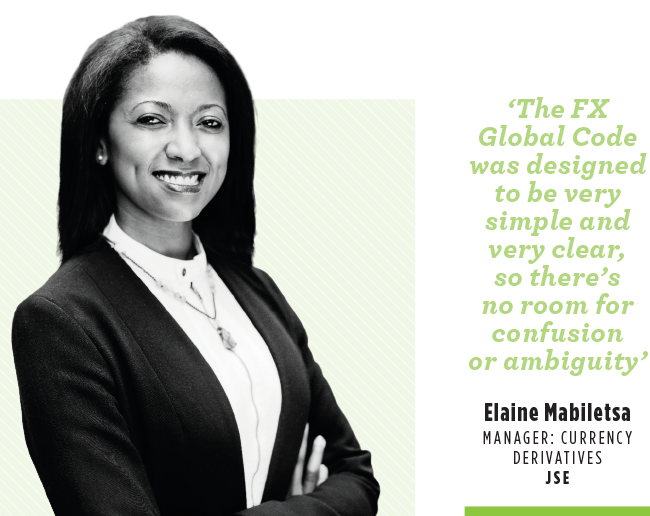Foreign exchange (FX) is one of the most diverse parts of the global economic machine. You’re dealing with currencies of different (and often wildly fluctuating) value, you have entities on the sell-side and the buy-side, banks, reserve banks, non-bank liquidity providers, brokers, asset managers, trading platforms… And so it continues. That’s a lot of complexity – sadly with some room for irresponsible behaviour. The FX Global Code, initially published in 2017 by the Global Foreign Exchange Committee (GFXC), aims to bring order and integrity into that space.
‘As you’ll often find in the financial sector, there are so many rules, principles and regulations that everything gets convoluted,’ says Elaine Mabiletsa, Manager: Currency Derivatives at JSE Capital Markets. ‘The FX Global Code was designed to be very simple and very clear, so there’s no room for confusion or ambiguity.’
Mabiletsa explains that the code was born, to a large extent, from the discovery of misconduct within the FX market. ‘Forex is a relatively young market, which didn’t have much in the way of guidance around conduct and ethics,’ she says. ‘There were reports of unethical behaviour, so the GFXC brought market participants together from across different geographies to say, “Guys, this is how we expect you to behave. Let’s play fair”.’
But instead of imposing legal or regulatory obligations on market participants, the FX Global Code offers a set of principles of good practice. These cover the areas of ethics, governance, execution, information sharing, confirmation and settlement, and risk management and compliance.
‘It is not legislation at all,’ says Mabiletsa. ‘It’s a set of guiding principles. However, because of the adoption of the code by numerous market participants – including reserve banks, exchanges, banks and so on – signing the Statement of Commitment has become almost a requirement before people will deal with you.’
In other words, you don’t have to agree to the Global Code. But other market participants don’t have to do business with you either. ‘In Europe, no one will deal with you from an FX perspective if you haven’t signed that Statement of Commitment,’ says Mabiletsa. ‘There are several registers where your Statement of Commitment is published, so it’s very easy to see, globally, who has committed to the code and who hasn’t. When the South African Foreign Exchange Code was launched in 2018, the South African Reserve Bank issued a statement to say that it would not conduct any business with any entity that has not signed that Statement of Commitment. That’s how seriously they’re taking it.’
Mabiletsa adds that by mid-January there were 1 000 signed and published Statements of Commitment worldwide. ‘And we’re talking about organisations on a global level, not the local units,’ she says. ‘It goes right to the top, and the buy-in has to come from the top too.’
The JSE was among the first signatories, signing its commitment to the FX Global Code in June 2018. In doing so, it underlined its belief that a well-functioning forex market is in the interest of all market participants – and that it has positive implications for the real economy as well.
‘It shows the JSE’s commitment to ensuring that, as much as we are regulated, we are also committed to an ethical code of conduct for our market participants,’ says Mabiletsa. ‘We are encouraging and supporting the drive for market participants to know that there are certain expectations regarding your conduct. Again, the code is not a rule or legislation, but from a JSE perspective we are making sure that we are ethical in everything we do.’









